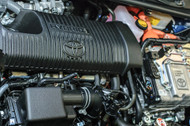An Introduction to Hybrid Vehicles and How They Work
29th Oct 2021

Hybrid vehicles have become increasingly common. Research shows that they now account for roughly 5% of all vehicles on the road, compared to just 2% for all-electric vehicles. Even if you've seen a hybrid vehicle, though, you may not know how they work. This post offers an introduction to hybrid vehicles and why are on the rise.
What Is a Hybrid Vehicle?
Also known as a hybrid electric vehicle, a hybrid vehicle is a type of automobile that features both a combustion engine and an electric drivetrain. They still have a traditional combustion engine that runs on gasoline. In addition to a combustion engine, however, hybrid vehicles have an electric motor.
How Hybrid Vehicles Work
Hybrid vehicles still feature many of the same parts as standard gas-powered vehicles They have a cooling system, transmission, exhaust system, battery, gas tank and, of course, a combustion engine. The main difference is that hybrid vehicles have an electric drivetrain or motor as well. This electric motor works in conjunction with the combustion engine to turn the wheels.
When driving a hybrid vehicle, the combustion engine will burn a mixture of gas and air -- just like standard gas-powered vehicles. As the combustion engine burns these elements, it will charge the battery. Both the combustion engine and the battery will then turn the hybrid vehicle's vehicles.
Benefits of Owning a Hybrid Vehicle
There's no denying the fact that hybrid vehicles are fuel efficient. You can check out the U.S. Department of Energy's (DOE's) website here for a breakdown of the efficiency of some of the top hybrid vehicles. Nonetheless, many of them get around 40 to 50 miles per gallon (MPG). In comparison, traditional gas-powered vehicles get around 20 to 30 MPG. And because they are fuel efficient, hybrid vehicles can save you money at the pump.
Hybrid vehicles don't require a plug to recharge like their all-electric counterparts. The battery must still be recharged. Recharging, however, occurs naturally from the combustion engine and, in some cases, braking. The combustion engine in a hybrid vehicle will recharge the battery, eliminating the need for plug-in recharging.
Hybrid vehicles are also quieter than gas-powered vehicles. They have a smaller combustion engine that produces less noise. And as you may know, hybrid vehicles are cleaner and better for the environment. This alone is reason enough for many people to invest in a hybrid vehicle.

